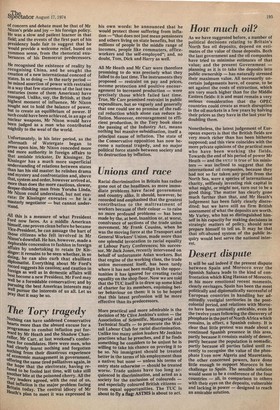How much oil?
As we have suggested before, a number of political decisions relating to Britain's North Sea oil deposits, depend on estimates of the value of those deposits. Both the last government and the oil companies have tried to minimise estimates of that value; and the present Government — planning as it is to take the deposits into public ownership — has naturally stressed their maximum value. All necessarily uncertain judgements have, of course, to be set against the costs of extraction, which are very much higher than for the Middle Eastern fields: it is and must remain a very serious consideration that the OPEC countries could create as much disruption in the oil markets in a few years by halving their prices as they have in the last year by doubling them.
Nonetheless, the latest judgement of European experts is that the British fields are very much richer than has been hitherto supposed; and this view coincides with the more private opinions of the practical men who have been working the fields. Towards the end of his period of power Mr Heath — and the Sl:TIV is true of his ministers — was inclined to suggest that the international oil companies, because they had not so far taken any profit from the North Sea, were a species of international charity, selflessly investing risk capital in what might, or might not, turn out to be a good thing. The matter has clearly gone much further than that, and Mr Heath's judgement has been fairly clearly discredited: but we have still no firm British assessment of what the deposits are worth. Mr Varley, who has so distinguished himself in his capacity for making decisions in strategic matters of policy, should now prepare himself to tell us. It may be that that oft-abused system of the public inquiry would best serve the national interest.


































 Previous page
Previous page